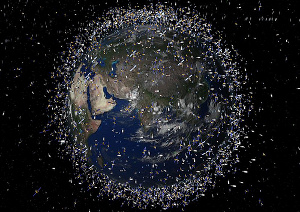MEDIA ROOTS- This is a disturbing story that exemplifies the throw-away mentality propagated by so many institutions on the planet. It’s something that isn’t thought about often, but the garbage being produced by humans on the planet is also affecting space.
Aside from the fact that there are two swirling trash islands in both the Atlantic and Pacific Ocean, there is now a ring of trash consisting mostly of minute fragments and debris from exploded satellites surrounding the planet that is so dense, experts are saying it is already a detriment to space exploration. Unfortunately, because of the shortsightedness of many, there is no clear plan on how this debris will be cleared or prevented from causing fatal destruction in future space ventures.
Abby
***
 BBC– A report by the National Research Council says the debris could cause fatal leaks in spaceships or destroy valuable satellites.
BBC– A report by the National Research Council says the debris could cause fatal leaks in spaceships or destroy valuable satellites.
It calls for international regulations to limit the junk and more research into the possible use of launching large magnetic nets or giant umbrellas.
The debris includes clouds of minuscule fragments, old boosters and satellites.
Some computer models show the amount of orbital rubbish “has reached a tipping point, with enough currently in orbit to continually collide and create even more debris, raising the risk of spacecraft failures,” the research council said in a statement on Thursday.
Situation ‘critical’
Hopes of limiting the amount of space junk in orbit suffered two major setbacks in recent years.
In 2007, China conducted an anti-satellite weapon test which destroyed a decommissioned weather satellite, smashing the object into 150,000 pieces larger than 1cm.
Two years later, two satellites – one defunct and one active – crashed in orbit, creating even more debris.
“Those two single events doubled the amount of fragments in Earth orbit and completely wiped out what we had done in the last 25 years,” said Donald Kessler, who led the research.
The International Space Station must occasionally dodge some of the junk, which flies around the Earth at speeds of up to 17,500 mph (28,164 km/h).
In June, some debris narrowly missed the space station, forcing its six crew to go to their escape capsules and prepare for an emergency evacuation back to Earth.
The situation is critical, said Mr Kessler, a retired Nasa scientist, because colliding debris creates even more of the junk.
“We’ve lost control of the environment,” he said.
Read more about Space Junk At Tipping Point, Says Report
© 2011 British Brodcasting Company
Photo by Flickr user inter-











Or is this story just another form of fear based mind control to scare us into submission and into the arms of the establishment